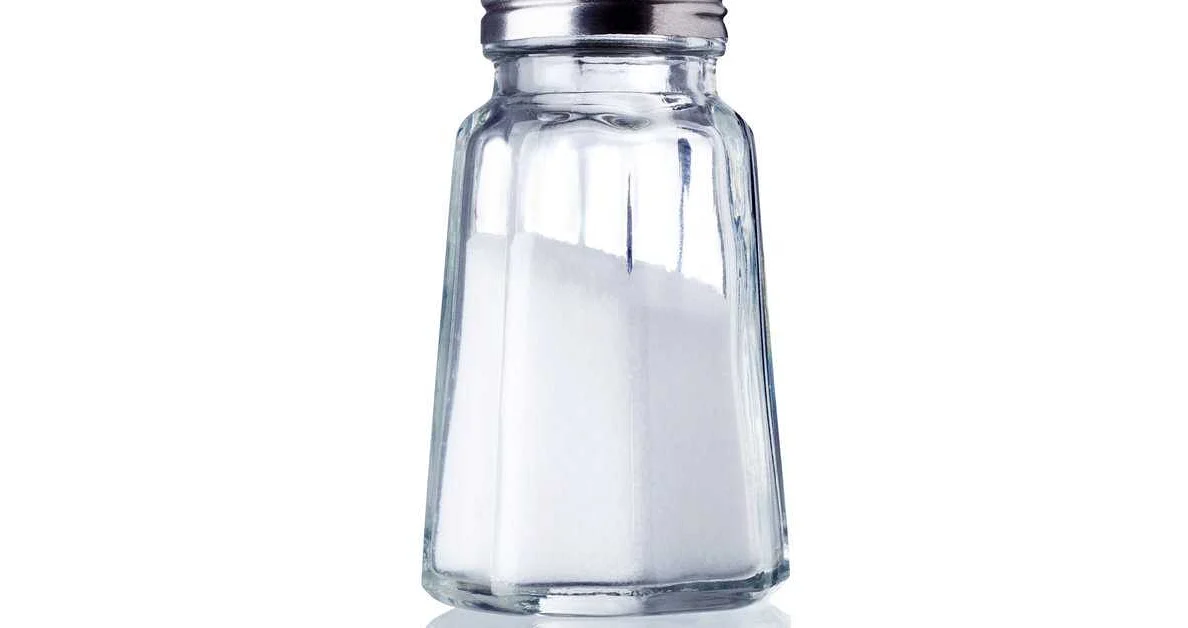Excessive salt leads to autoimmune diseases
Содержимое
Excessive salt consumption has been linked to the development of autoimmune diseases. Learn how high sodium intake can negatively impact the immune system and increase the risk of conditions such as rheumatoid arthritis, lupus, and multiple sclerosis. Discover ways to reduce salt intake and promote a healthier immune response.
Autoimmune diseases have become an increasingly prevalent health concern in recent years. These conditions occur when the immune system mistakenly attacks healthy cells and tissues in the body, leading to chronic inflammation and a variety of symptoms. While the exact cause of autoimmune diseases is still unknown, researchers have been exploring various factors that may contribute to their development.
One such factor that has garnered attention is the consumption of excessive salt. Salt is a dietary staple that is used to enhance the flavor of food and preserve it. However, studies have suggested that a high intake of salt can disrupt the delicate balance of the immune system and trigger autoimmune responses.
The link between salt consumption and autoimmune diseases lies in the effect of salt on immune cells. Research has shown that excessive salt can increase the production of pro-inflammatory molecules and activate immune cells called T helper 17 (Th17) cells. These cells are known to play a role in autoimmune diseases such as rheumatoid arthritis, multiple sclerosis, and psoriasis.
Furthermore, salt has been found to affect the gut microbiota, which are the trillions of bacteria that reside in our intestines and play a crucial role in immune system regulation. Studies have shown that a high-salt diet can alter the composition of the gut microbiota, leading to an imbalance that promotes inflammation and autoimmune responses.
While more research is needed to fully understand the relationship between salt consumption and autoimmune diseases, these findings suggest that reducing salt intake may be beneficial for individuals at risk of or already diagnosed with autoimmune conditions. It is important to note that salt is not the sole cause of autoimmune diseases, but rather one of several factors that may contribute to their development.
Understanding the Connection
Autoimmune diseases occur when the immune system mistakenly attacks healthy cells and tissues in the body. While the exact causes of autoimmune diseases are still unknown, there is growing evidence suggesting that excessive salt consumption may play a role in triggering or exacerbating these conditions.
The immune system is responsible for protecting the body against foreign invaders, such as viruses and bacteria. However, in individuals with autoimmune diseases, the immune system mistakenly targets the body’s own cells and tissues. This leads to inflammation and damage to various organs and systems, resulting in the symptoms associated with autoimmune diseases.
High salt intake has been found to activate certain immune cells, known as T helper cells, which play a crucial role in the immune response. When these cells become overactive, they can produce excessive amounts of inflammatory molecules, such as cytokines, that contribute to the development and progression of autoimmune diseases.
In addition, excessive salt consumption has been linked to an imbalance in the gut microbiota, which refers to the trillions of bacteria living in the digestive tract. The gut microbiota plays a vital role in regulating immune function and maintaining overall health. However, an imbalance in the gut microbiota can disrupt the immune system, increasing the risk of autoimmune diseases.
Moreover, excessive salt intake has been associated with an increase in blood pressure, which can damage blood vessels and promote inflammation. Chronic inflammation is a known risk factor for autoimmune diseases, as it can contribute to the breakdown of self-tolerance and the development of autoimmunity.
While more research is needed to fully understand the connection between excessive salt consumption and autoimmune diseases, the existing evidence suggests that reducing salt intake may be beneficial for individuals with these conditions. By adopting a balanced diet and minimizing salt intake, individuals can potentially reduce inflammation, support a healthy gut microbiota, and improve overall immune function.
In conclusion, while the connection between excessive salt consumption and autoimmune diseases is still being explored, it is becoming increasingly clear that reducing salt intake may have a positive impact on immune function and potentially help manage these conditions. If you have an autoimmune disease or are at risk, it is worth considering reducing your salt intake under the guidance of a healthcare professional.
Effects of Excessive Salt Intake

Excessive salt intake has been linked to a variety of negative health effects. When consumed in excess, salt can lead to an increase in blood pressure. High blood pressure, also known as hypertension, is a major risk factor for cardiovascular diseases such as heart disease and stroke.
In addition to its impact on blood pressure, excessive salt intake can also have detrimental effects on the kidneys. The kidneys play a crucial role in maintaining the body’s fluid balance and regulating sodium levels. When salt intake is too high, the kidneys may struggle to remove the excess sodium, leading to fluid retention and potentially causing damage to the kidneys over time.
Furthermore, excessive salt consumption has been associated with an increased risk of certain autoimmune diseases. Autoimmune diseases occur when the immune system mistakenly attacks healthy cells and tissues in the body. Studies have suggested that a high-salt diet may contribute to the development or exacerbation of autoimmune conditions such as rheumatoid arthritis and multiple sclerosis.
Another consequence of excessive salt intake is its impact on bone health. Research has indicated that a high-salt diet may increase the loss of calcium from the body, which can weaken bones and contribute to an increased risk of osteoporosis.
Lastly, excessive salt consumption can also have negative effects on the gastrointestinal system. Too much salt in the diet has been linked to an increased risk of gastric cancer and may contribute to the development of stomach ulcers.
In conclusion, excessive salt intake can have various detrimental effects on our health, including increased blood pressure, kidney damage, heightened risk of autoimmune diseases, weakened bones, and gastrointestinal issues. It is important to be mindful of our salt intake and aim to consume a well-balanced diet that is low in sodium to maintain optimal health.
Role of Salt in Autoimmune Diseases

Excessive salt consumption has been found to have a significant impact on the development and progression of autoimmune diseases. Autoimmune diseases occur when the immune system attacks healthy cells and tissues in the body, leading to inflammation and potential damage.
Recent research suggests that high levels of salt in the diet can trigger and exacerbate autoimmune responses. Salt has been found to activate immune cells and promote the production of inflammatory cytokines, which are signaling molecules that contribute to the autoimmune response.
In addition, excessive salt intake can also lead to an imbalance in the gut microbiome, which plays a crucial role in immune system regulation. The disruption of the gut microbiome can further promote the development and progression of autoimmune diseases.
Furthermore, salt has been shown to increase the production of Th17 cells, a type of immune cell that is involved in the development of autoimmune diseases. Th17 cells produce pro-inflammatory cytokines and contribute to the chronic inflammation seen in autoimmune conditions.
Several studies have demonstrated a link between high salt consumption and the development of autoimmune diseases such as rheumatoid arthritis, multiple sclerosis, and inflammatory bowel disease. In animal models, excessive salt intake has been shown to worsen disease symptoms and accelerate disease progression.
Reducing salt intake may therefore be an important strategy in the management and prevention of autoimmune diseases. By reducing salt consumption, individuals may be able to modulate their immune system and potentially alleviate symptoms associated with autoimmune conditions.
| Rheumatoid arthritis | Excessive salt intake can worsen inflammation and joint damage. |
| Multiple sclerosis | High levels of salt have been linked to increased disease activity and progression. |
| Inflammatory bowel disease | Salt can exacerbate intestinal inflammation and contribute to disease flare-ups. |
In conclusion, the role of salt in autoimmune diseases is significant. Excessive salt consumption can trigger and worsen autoimmune responses, disrupt the gut microbiome, and promote inflammation. It is important to be mindful of salt intake and consider reducing it as a potential strategy in managing autoimmune diseases.
Research Findings
Multiple studies have explored the potential link between excessive salt consumption and autoimmune diseases. Here are some key findings:
- A study published in the Journal of Immunology found that a high-salt diet can lead to the activation of immune cells called Th17 cells, which have been implicated in the development of autoimmune diseases such as multiple sclerosis and rheumatoid arthritis.
- Another study conducted at the University of Erlangen-Nuremberg in Germany discovered that excess salt intake can alter the gut microbiota, a community of microorganisms in the digestive system that plays a crucial role in immune system function. This disruption of the microbiota can contribute to the development of autoimmune diseases.
- Research published in the Proceedings of the National Academy of Sciences suggests that excessive salt consumption may trigger the production of pro-inflammatory molecules called cytokines, which can promote inflammation and autoimmune responses.
- A study published in the Journal of Clinical Investigation found that high salt intake can impair the function of regulatory T cells, a type of immune cell that helps prevent excessive immune responses. This dysfunction of regulatory T cells can contribute to the development of autoimmune diseases.
While these findings suggest a potential link between excessive salt consumption and autoimmune diseases, more research is needed to fully understand the mechanisms involved. It is important to note that moderation is key when it comes to salt intake, and individuals with autoimmune diseases should consult with their healthcare providers for personalized dietary recommendations.